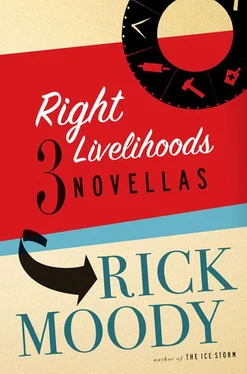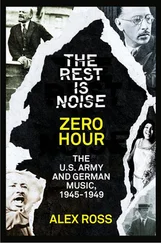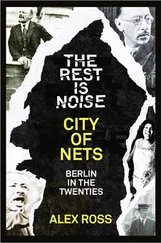Frankly, I couldn’t have lived with Piccolo for another fifty pages, and his novelistic urge to spill the entire story in his last speech is difficult to take. Still and all, whichever jihadists brainwashed him had already prepared for this moment, the moment when he enacts the murder of his doomed romantic obsession. Meanwhile, the Omega Force has plan B in place. Either Piccolo murders the small-town lawyer, and the Omega Force reaches the PIADC unimpeded, or he does not. But by distracting Bonnie Peebles, by encouraging local law enforcement to follow the stolen Coast Guard launch, the Omega Force ensures a clean getaway, in scuba gear, so that they can live to fight another day — in the next Stuart Hawkes-Mitchell sequel.
It was the realization that such a stunning reversal — the imminent betrayal by Ernest Piccolo, a.k.a. Ed Thorne — might already have been in the offing that led me to undertake some quiet interrogation of the persons gathered at the party. Sotto voce, naturally. I was performing the role of the intoxicated retiree, and performing, I must say, with a certain spirited aplomb. As soon as I had what information I needed, Skip and I could repair to the brush beyond, to see if men in wet suits were indeed scrabbling up the eroding face of Carson’s Bluff, just out of view.
To the contestant named Meghan I mumbled the following question: “Was a rather gruff man called Ernest Piccolo here earlier in the evening? Before we arrived?”
“Who?”
“Ernest Piccolo. Rough-hewn, salty guy, curses like a sailor. Might have attempted to take advantage of you.”
“I don’t know what you’re talking about.”
“Excuse me, then. Thank you for your time.”
11. Policy Recommendations
To maintain deep cover, it was crucial that I should be seen serving myself more of the punch, so I poured a liberal amount of it into one of the plastic cups available. Just beyond the punch, a strapping young man I recognized as one of the soda jerks from the ice cream establishment in town was singing quietly to himself. He too had liberally sampled the punch, and he was well on his way from here to eternity. I asked him if there had been an infiltration of this beach party by person or persons unknown to him, dark-complected persons, persons who might seem to have allegiances to foreign powers, particularly powers of a globalist perspective, powers that were aligned with uncontained growth of a united Europe, or perhaps powers that had a pan-Arabist or pan-African worldview. Did he perhaps see Sudanese Arabs coming down the beach? Riding Arabian stallions, bent on some kind of ethnic cleansing? Did he see any of these things? Anything out of the ordinary? Anything at all?
The soda jerk stopped singing abruptly and fixed me with a rheumy eye. “Damn straight,” he said. “Damn straight, I did. I saw them. I saw them all around. There were guns going off. They were running up and down the beach and they were raping and pillaging and they were stealing everything that was left to steal, everything that wasn’t screwed down. They were stealing people’s television sets, especially the flat-screen ones, and they were stealing the satellite dishes because they knew with the satellite dishes they could make us all watch Arabic-language cable stations, and they were taking the family silver, and they were melting it down and they were making statues out of the silver, fat Buddha, Mohammed, Ganesh. And they were stealing the expensive twenty-speed racing bikes with the little mounting thing where you put the bottled water. Oh yeah, and the cars. They took every Hummer on the island, every one of those Hummers on the island, they took them, and they made some kind of military convoy with all the Hummers. And the tank, the guy who owns that tank and drives it down to get the newspaper, they took that guy’s tank, and they actually ran over him with it, because nobody should own a tank, not even as a joke.”
The young man did not stop here. He went on to describe a host of signs of the invasion. The hostiles took a lot of clothes because, the young man said, there was nowhere else on earth you could get clothes in these colors, and the clothes would serve as camouflage. They went rampaging into our town, seizing hostages along the way. They stole all the trunks of garments from the Lilly Pulitzer trunk show. And then these dark-complected guys broke up some barbecues that were under way, because, the young man told me, the food was too bland, and when the strict Islamic sharia was adopted on the island, whoever hadn’t died a nasty, violent death was going to have to learn to mash their own chickpeas, and they weren’t going to be able to drink alcoholic beverages, because that was part of the sharia, no more drinking. “And because we knew they were coming,” the soda jerk continued, “we came down here, because hell if we’re going to watch them pour out all the rest of the booze when we could have the chance to drink some of it ourselves, so we came down here to wait for it all to happen.”
These were his words! Raping and pillaging! Arabic-language cable stations! Lilly Pulitzer! Strict Islamic codes! I stared at him for a moment, absolutely uncertain about what I should do. Knowledge itself had been vitiated, vaporized, obliterated, in the international conflict flourishing here on the island. Old-fashioned know-how was the thing that once brought the constellations into focus, the Big Dipper and its neighbors. Knowledge was the thing that enabled you to read the morning paper, to digest the day’s events; knowledge was what you used when you were telling your son what to believe and what to ignore. But knowledge and certainty had been wiped out in the conflict at hand. It was now impossible to verify anything at all. I’d had weeks to research and to cross-reference all the various strains of the story. I’d found that an architect on the island was illegally building modern architecture against the wishes of the local citizenry, and through these structures, through the heretical cult of modernism, he was indoctrinating people into decadent lifestyles and signaling about this to Islamist compatriots. I had learned that people with dark complexions had been landing on our island in small aircraft, as witnessed by our once proud fisherfolk, and these people were taking photographs of our island, without permission, in an effort to mount attacks on high-value targets in our neighborhood, where certain rogue elements were also beginning to experiment with increasingly unstable germs.
Which side was which? The sides had become indistinguishable. The government position either included my own wife, who was acting in a way that was frankly conspiratorial by my standards, and Ernest Piccolo, who may or may not have been a once proud fisherman of our island, or who may or may not have been a character in a novel called Omega Force: Code White, a novel that may or may not have been written by someone called Stuart Hawkes-Mitchell, whose own Cessna aircraft may or may not have been the one flown to this very island by certain dark-complected people, or else this Cessna aircraft may have gone down in a fiery crash in western Massachusetts, which suggested that he was either a casualty of the dark-complected or he was a confederate of same. Was Hawkes-Mitchell on the side of the government? Was he attempting to suppress a revolution? Or was he attempting to hasten it? Was the government attempting to control the revolution or not? Was the government for the people or against the people? And on what basis was it possible to ascertain these things?
I shook the young soda jerk roughly in an attempt to get him to answer further questions, but he was now apparently disinclined to respond. In any event, my attention was called away because, sitting on the great white log by the bonfire, the young man called D’Arcy was now offering Skip, my beloved son, heir to all that I had done and would attempt to do, some of the punch. Now my son Skip was drinking the punch and I was rushing to my son’s side, where unfortunately I had no choice but to slap the cup of punch out of his hand.
Читать дальше












